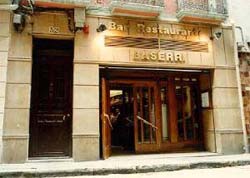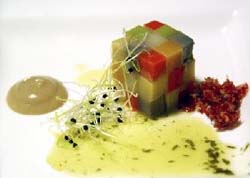
Restaurante Baserri - Pamplona
The Restaurante Baserri is a Spanish restaurant in Pamplona which specialises in pinchos and tapas from the region of Navarre as well as traditional recipes. However the Restaurante Baserri also produces traditional Spanish recipes combined with a creative, modern twist.
The Restaurant
The Restaurante Baserri has been around for a long time. Originating back in 1931, the restaurant was first called Café Irañeta and it was much more like a local pub. The atmosphere there must have been great as there was often live music and many parties. The Café Irañeta also served tapas from its marble bar, like the restaurant of today does.
 This café was so popular in the city of Pamplona that it was visited by several famous people from the world of art and literature. Among these was the famous American writer, Ernest Hemingway, who made many trips to Spain and he particularly liked to travel to Pamplona in order to see the Sanfermines in the city.
This café was so popular in the city of Pamplona that it was visited by several famous people from the world of art and literature. Among these was the famous American writer, Ernest Hemingway, who made many trips to Spain and he particularly liked to travel to Pamplona in order to see the Sanfermines in the city.
Today the restaurant has changed from being a local pub into a gastronomic hotspot both in the city of Pamplona and in the region of Navarre as a whole. The restaurant as we know it today had been running since 1963 and has achieved many rewards and prizes for its cuisine over the decades.
The Restaurante Baserri is decorated in a traditional style with a tiled floor and some tiles on the walls. The majority of the interior walls are adorned with pictures from the restaurant's past as well as traditional style paintings. The bar is also decorated with traditional Spanish-style red, black and white tiles. The diamond pattern of these tiles is almost as exciting as the beautifully presented tapas you can find atop this bar.
The Menu
The Restaurant Baserri offers around thirty different types of tapas and pinchos in its bar, all of which are made from local ingredients and with the intention of creating some surprising flavours. Even in these small dishes, the kitchen team attempt to head towards the vanguard style of cuisine without losing the traditional aspect of the recipes.
Aside from the Spanish tapas and pinchos, the Restaurante Baserri offers a selection of menus including a daily menu, a special menu and a children's menu. They also offer a collection of group menus which are a great option if you are having a party or a celebration when you visit Spain.

Some of the highlights from these menus include the 'Conejo asado con timbal de morcilla' (Roast Rabbit with black pudding timbale), 'Solomillo plancha con guarnición o Roquefort' (Sirloin steak with either garnish or Roquefort cheese), and 'Lubina asada' (Roast Sea Bass).
However if you really want to experience the best in the Restaurante Baserri's vanguard style of cooking then you should try one of the dishes that the restaurant recommends. The 'Hamburguesa Ion' (Ion Hamburger) is this Spanish restaurant's signature dish and consists in a veal burger with avocado and caramelised pineapple which is then put in one of the finest buns of Navarre. But the recommendations don't stop there, the restaurant also suggests you try their famous, and award-winning, cube. This cube is made to look like a Rubik's Cube as it is made out of twenty-seven smaller cubes in different colours. These cubes are gelatine infused purées of various vegetables including asparagus, carrot, cabbage and pepper. All of these vegetables are sourced locally making the cube a perfect tribute to the fertile and versatile region of Navarre.
Prizes
This Spanish restaurant in Pamplona is not only famous for its creative dishes, but also because it has achieved substantial success in Pamplona and the region of Navarre. Among its many decorations, the Restaurante Baserri has received the prize for the Best Wine Service in Navarre and the Pamplona City Council Prize for its service and contribution to the hospitality industry of Pamplona.
The Restaurante Baserri has also been rewarded for its dishes too as they enter many regional cooking competitions. In 2006 they won the first prize in the 'II Certamen del Piquillo de Lodosa', and in 2005 they were made a finalist in the Navarre Pinchos Week.


